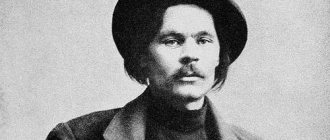What is the meaning of the title of the play “At the Bottom”?
Respect for the name of man, endless love for a person simply because he is a man, without any relation to his personality and to his nationality, faith and rank, even his personal dignity or unworthiness - in a word, endless love and endless respect for humanity, even in the person of the last of its members, it must be the element, the air, the life of man.
V.G. Belinsky Gorky came up with several options for the title for his play: “Without the Sun”, “Nochlezhka”, “The Bottom”, “At the Bottom of Life”, but chose the most laconic and successful - “At the Bottom”. The author's first remark, describing Kostylev's rooming house, makes it clear that the title implies the “bottom” of society where the heroes of the drama find themselves. These are completely degraded people who have nowhere to fall further: they have no home, family, normal human attachments, some don’t even have a name - everyone around them calls them by nicknames. Thus, the title indicates the social issues of the play. The playwright carefully portrays several night shelters, and from the conversations on stage the reader learns their life stories. Baron Debil was an aristocrat, he served somewhere, but he stole and went to prison. Now he is a pimp for a penny prostitute Nastya. Telegraph operator Satin, defending his beloved sister, killed her husband. After the trial, Satin was angry with the whole world, so he had only one way from prison - to the shelter. Bubnov, the former owner of a dyeing shop and a heavy drunkard, left all his property to his wife and left home for nowhere. Locksmith Kleshch went bankrupt due to the illness of his wife, whom he brought to this illness with his beatings and drunkenness. The actor was kicked out of the theater for drunkenness. Vaska Ash’s father-thief could not teach anything other than how to steal. In a word, the night shelters are very similar in their bitterness against the whole world, in their contempt for other people’s and even their own lives. They are indifferent to their past, and most importantly, to their present and future. Here, as Bubnov says, “everything faded away, only one naked man remained” (I). But the social content does not exhaust the play; it has a very significant philosophical content, which naturally follows from the social. Gorky shows that even at the “bottom” people retain the ability to think. The night shelters ask the “last” philosophical questions about man - truth - freedom. In the play, almost every character speaks about the truth. Kvashnya reproaches Kleshch for “beating his wife half to death” (I). The tick responds with rude curses, and the dumpling seller calmly states: “Ah! You can’t stand the truth!” (ibid.). Vasilisa considers Luka not a passer-by, but a rogue: “This is closer to the truth” (ibid.). Ash threatens that he will denounce Kostylev, who is buying up stolen things, and they will believe the denunciation, “because it’s true!” (II). All these discussions about the truth do not go beyond everyday (“kitchen”) conversations. But with the arrival of Luke, life in the shelter “fermented,” according to Satin. From fragmentary remarks about the truth, expressed as if casually, the night shelters move on to entire philosophical concepts about truth and man. Events - the usual dramaturgical action (for example, the love story of Vaska Pepel) - fade into the background, and in the foreground are clashes of philosophical concepts that create the main conflict of the drama “At the Bottom”. Gorky offers at least four points of view on truth in human life. This is the point of view of Kostylev, who opposes the truth in general, since it only disturbs the common people and threatens the peace of “decent people.” Bubnov believes that the truth is needed without embellishment and dreams, it should simply record the real state of affairs in the world. Luka opposes Bubnov’s truth: the truth, the old man claims, is what you believe in. Luka believes that it is better to console people, to entice them with a dream, than to repeat the hopeless “Bubnova” reasoning that all people on earth are superfluous. Finally, Satin formulates a high understanding of truth, which helps a person to live; his truth calls for creative work: “Man is the truth! (...) Lies are the religion of slaves and masters... Truth is the god of a free man! ...Only man exists, everything else is the work of his hands and his brain!” (IV). Proving that even at the “bottom” of society a person remains a person, Gorky at the same time depicts the weakness of people at the “bottom”. It was no coincidence that they ended up in a shelter, for they are all weak-willed, embittered, sick people who, according to the playwright, “are terrible first of all because of their despair, because they deny themselves and cast themselves out of life.” In other words, the night shelters themselves are indifferent to their own fate, and blame everyone but themselves for their misfortunes. They call Luka a “charlatan” (IV): he lured them with a beautiful dream of a better life and fled immediately after the murder of Kostylev. But the point is not in Luke, but in the spiritual weakness of the night shelters themselves, in their inability and unwillingness to do anything to rise from the “bottom.” To summarize, it should be admitted that the author titled his play about tramps very successfully, since the title turned out to be ambiguous. The images of tramps, so interesting for Gorky, are revealed in the drama in many ways and are associated with philosophical reflections about man - freedom - truth. At the “bottom” people live in inhumane conditions (the shelter looks like a cave), but even in these conditions people can think about lofty things - about truth and freedom. This depiction of tramps reveals the author’s humanism. In his first stories about tramps (“Chelkash”, “Konovalov”, “Former People”) Gorky presented them as “extraordinary” people: they are not greedy, do not strangle each other over things, do not hoard money, that is, they differ from “ decent" philistines with a sense of inner freedom, special generosity. In the play there is no such romantic view of tramps: the playwright no longer ennobles his characters, but notes their helplessness, anarchism, and inability to act and self-education. Gorky now admits: tramps, despite their resolute denial of the laws of an unjust society, cannot change anything in the life around them, so he will look for real heroic fighters among the conscious proletarians and democratic intelligentsia. The writer will devote the novel “Mother” (1907) to the depiction of such heroes.
Writer Maxim Gorky came up with several titles for the title of the famous play. He thought of calling it “Without the Sun,” “Nochlezhka,” “The Bottom,” or even “At the Bottom of Life.” However, the author settled on the “At the Bottom” option - it seemed to him the most laconic. You can understand that the “bottom” in the title is the bottom of society where the characters in the play find themselves from the author’s first remark, which tells about the shelter and its inhabitants. Those who live there are degenerate people who have nowhere to fall. They lost their home, their jobs, their families, their human affections. As a result, we understand that the title is an indication that the play has social issues.
The author described the characters of several inhabitants of the shelter. Viewers learn life stories from conversations on stage. So, Baron Debil was once an aristocrat who later served in a bank, but he was sent to prison for theft. After his release from prison, he became a pimp for the prostitute Nastya.
Satin, a telegraph operator, also committed a crime: he stood up for his sister and as a result killed a man, for which he served 4 years and 7 months in prison. Judging by the fact that the period was relatively short, there were apparently mitigating circumstances and the murder was justified. After leaving prison, Satin became embittered with life, since the shelter was the only place where the road was now open to him. In his harsh consciousness, life has lost all values, ceased to matter, it is no coincidence that he says: “... you cannot kill twice.”
Bubnov once ran a dyeing workshop. But the wife got in touch with the master lover, and they planned to kill him. He wanted to respond in kind, but thought better of it. And since the workshop was registered in the name of his wife, he left all the property to his wife and left the house. Klesh is a mechanic and a drunkard. He was driven into poverty by his wife’s illness, which was caused by himself: he beat the woman all the time.
The actor was also ruined by drunkenness, because of which he was kicked out of the theater. Vaska Pepel is a hereditary thief. His father taught him this shameful skill, and Ash could not do anything else in this life. The inhabitants of the shelters are united by their hatred of the ordinary world and disdain for the lives of others and even their own. These people are indifferent to their own past, as well as the present and the future. Bubnov talks about it this way: “...everything faded away, only one naked man remained.” Gorky did not limit himself to the social theme - the author laid down a significant philosophical content that naturally follows from the social. In the play, Gorky shows that people can retain the ability to think clearly even at the “bottom.” The inhabitants of the shelter reflect on man - truth - freedom. Almost all the characters in the play speak about the truth in one way or another. Kvashnya reproaches Kleshch for “beating his wife half to death.” In response to the accusations, he responds with abuse, to which Kvashnya retorts: “Ah! You can’t stand the truth!” Vasilisa Kostyleva calls Luka not a passer-by, but a rogue: “This is closer to the truth.” Vaska Pepel declares that he will inform on Kostylev, who is buying stolen goods. He is convinced that the denunciation will be accepted, “because it’s true!” However, discussions about the truth remain outside the scope of everyday, “kitchen” conversations. Although with the appearance of Luka, life in the shelter, as Satin put it, “fermented.” The night shelters develop from fragmentary remarks about the truth, which they expressed as if casually, to real philosophical concepts about man and truth. Dramatic actions (for example, Ash’s love conflict) remain in the background. Collisions of philosophical concepts come to the fore - this forms the key conflict of the play “At the Bottom”.
According to M. Gorky, there are at least four points of view on the truth. These concepts are represented by different characters. Refusal to acknowledge the existence of truth - this is Kostylev’s position. In his opinion, the truth only creates confusion among the people and creates a threat to the quiet existence of “decent people.” According to Bubnov, the truth should be without embellishment and dreams. Its main task is to indicate the real state of affairs in the world. Luka is an opponent of Bubnov's truth. What you believe is the truth. According to Luke, it is necessary to console people and instill in them faith in their dream. The old man considers Bubnov’s reasoning that people on earth are superfluous to be incorrect and hopeless. Satin comes to a high awareness of the truth: “Man is the truth! (...) Lies are the religion of slaves and masters... Truth is the god of a free man! ...Only man exists, everything else is the work of his hands and his brain!” Such truth gives a person help, sets him up to live and move forward.
In the play, the author proved that there are people who are capable of remaining human, even being at the very “bottom” of society. At the same time, in his work, Gorky showed how weak the society of the “bottom” is. It was not without reason that the characters in the play ended up in the shelter, because each of them is embittered by life and weak-willed. These people are sick, they are “terrible, first of all, because of their despair, because they deny themselves, they cast themselves out of life.” In short, the inhabitants of the shelter blame anyone but themselves for their troubles, while they themselves are completely indifferent to their fate. They accuse Luka of charlatanism, since he gave them hope for a better life, and at the same time disappeared immediately after the murder of Kostylev. However, Luke is not at all to blame; the whole point is that spiritually the night shelters are weak and helpless. They cannot and do not want to make their lives better, to make at least some attempts to finally rise from this very “bottom”.
In conclusion, I would like to say that Gorky found the most suitable title for his play about unfortunate beggars. In the drama, the author revealed in detail the image of each tramp, and through many characters showed opposing philosophical concepts about man, freedom and truth. At the “bottom” people do not live, but exist or live, because these conditions are inhuman (the author compares the shelter with a cave), although even in such conditions some people are able to talk about lofty things: about freedom and truth. By portraying tramps who are not alien to such serious reasoning, Gorky showed his humanism.
The first stories dedicated to tramps (“Chelkash”, “Konovalov”, “Former People”) were written in such a way that these people are depicted as “extraordinary”. The characters in these works are not endowed with such a vice as greed. They are not able to strangle each other over things and do not collect money, in other words, they are endowed with generosity and a sense of inner freedom, which “decent” philistines do not have. If we talk about the play “At the Lower Depths,” then there is no longer a trace of that romantic idea of tramps: in this drama the author did not ennoble the heroes and endow them with similar qualities. Gorky focuses on the helplessness of the night shelters, anarchism, lack of desire to change life for the better and the ability to act. Gorky's opinion about tramps has changed: tramps are weak, helpless, embittered people who are destined to die on this day, since they cannot and do not want to get out of it. From now on, the author is looking for heroic fighters among the democratic intelligentsia. Gorky dedicated his novel “Mother” to such characters.
Reading in the section:
- The image of Luke in M. Gorky’s play “At the Lower Depths”
- The finale of the fourth act. Analysis of Gorky's play “At the Depths”
- Neo-romanticism and the early work of Maxim Gorky
- Disputes about man in M. Gorky's play “At the Depths”
- M. Gorky's story "Makar Chudra". Life position of the heroes
- Realistic and romantic in the story “Old Woman Izergil”
- The life of the night shelters before the appearance of Luke. Analysis of the play “At the Bottom”
Previously published in the section:
- The theme of love in Gorky's play "At the Lower Depths"
- Realistic and romantic in the story “Old Woman Izergil”
- M. Gorky's story "Makar Chudra". Life position of the heroes
- The image of Luke in M. Gorky’s play “At the Lower Depths”
- Disputes about man in M. Gorky's play “At the Depths”
- Neo-romanticism and the early work of Maxim Gorky
New section materials:
- The path of Nilovna's spiritual revival. Based on the novel "Mother"



